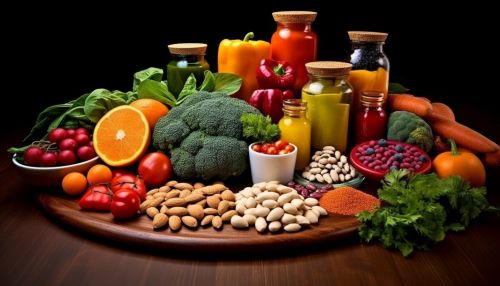The Science of Nutrition and Metabolism
Introduction
The science of nutrition and metabolism is a broad field that encompasses the study of nutrients in food, how the body utilizes these nutrients, and the resulting metabolic processes. It involves the examination of the roles of various nutrients, how they interact, balance, and contribute to health, and how lack or excess of these nutrients can lead to diseases.


Nutrition
Nutrition is the science that interprets the interaction of nutrients and other substances in food in relation to maintenance, growth, reproduction, health, and disease of an organism. It includes food intake, absorption, assimilation, biosynthesis, catabolism, and excretion.
Macronutrients
Macronutrients are nutrients that provide calories or energy. Nutrients are substances needed for growth, metabolism, and for other body functions. There are three types of macronutrients: carbohydrates, proteins, and fats.


Carbohydrates
Carbohydrates are the body's main source of energy. They are called carbohydrates because, at the chemical level, they contain carbon, hydrogen, and oxygen. There are two types of carbohydrates: simple and complex. Simple carbohydrates include sugars found naturally in foods like fruits, vegetables, milk, and milk products. They also include sugars added during food processing and refining. Complex carbohydrates include whole grain breads and cereals, starchy vegetables and legumes.
Proteins
Proteins are large, complex molecules that play many critical roles in the body. They do most of the work in cells and are required for the structure, function, and regulation of the body's tissues and organs. Proteins are made up of hundreds or thousands of smaller units called amino acids, which are attached to one another in long chains.
Fats
Fats are a type of nutrient that you get from your diet. It is essential to eat some fats, though it is also harmful to eat too many. The fats you eat give your body energy that it needs to work properly. During exercise, your body uses calories from carbohydrates you have eaten. But after 20 minutes, exercise then depends on calories from fat to keep you going.
Micronutrients
Micronutrients are one of the major groups of nutrients your body needs. They include vitamins and minerals. Vitamins are necessary for energy production, immune function, blood clotting and other functions. Meanwhile, minerals play an important role in growth, bone health, fluid balance and several other processes.


Metabolism
Metabolism refers to all the physical and chemical processes in the body that convert or use energy, such as:
- Breathing - Circulating blood - Controlling body temperature - Contracting muscles - Digesting food and nutrients - Eliminating waste through urine and feces - Functioning of the brain and nerves
Basal Metabolic Rate
Basal Metabolic Rate (BMR) is the number of calories required to keep your body functioning while you are not doing any physical activities. BMR is the single largest component (upwards of 60 percent) of your total energy burned each day.
Metabolic Pathways
A metabolic pathway is a linked series of chemical reactions occurring within a cell. The reactants, products, and intermediates of an enzymatic reaction are known as metabolites, which are modified by a sequence of chemical reactions catalyzed by enzymes.


Nutrition and Metabolism Disorders
Nutrition and metabolism disorders are a group of conditions that occur when the body's metabolic process is disrupted. This can happen as a result of a variety of factors including a poor diet, obesity, infection, genetic defects, and other factors. Some of the most common nutrition and metabolism disorders include diabetes, metabolic syndrome, and obesity.
Conclusion
Understanding the science of nutrition and metabolism is essential for maintaining optimal health and preventing disease. By understanding how the body uses nutrients and how it metabolizes them, we can make informed decisions about our diet and lifestyle to promote health and longevity.
See Also
- Diet - Digestion - Human nutrition - Metabolic pathway - Nutrient - Obesity
